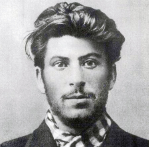|
Ferrinus posted:But first, we need to clear something up, because every time I post theory for liberating a country in a half-revolution, I get the same comments asking over and over what it means, even though I have a whole paragraph in the introduction explaining it, which even starts with "if you're wondering what a half-revolution is, read this before commentating to ask". But maybe what you guys need isn't a paragraph. Maybe you guys need an EXAMPLE. lmfao this had me fooled for an embarrassingly long time e: rescued from the bottom of the page
|
|
|
|

|
| # ? May 9, 2024 21:23 |
|
what
|
|
|
|
GunnerJ posted:what Imagine four revolutions on the edge of a cliff.
|
|
|
|
I use floating point revolutions This post was 0.000000069ths of a revolution yw
|
|
|
|
socialism in one country is not a problem because of the development of the productive forces of the soviet union, something that the left opposition argued for. the problem is a political one of the approach of the comintern to the labor and communist parties of the rest of the world. the politics became focused on using the other parties of the comintern as extensions of the russian communist party and therefore to exist to spread and promote the interests of the USSR over those of the national labor movements where they were based. if you read the history of the factional struggles in the CPUSA during the period from 1923-1930 you see the comintern stepping in and basically overriding leadership and decision making by the US sections and forcing the section to remove its leadership. it completely destroyed the democracy within the party and cut it off from many of the workers struggles of the time.
|
|
|
|
apropos to nothing posted:socialism in one country is not a problem because of the development of the productive forces of the soviet union, something that the left opposition argued for. the problem is a political one of the approach of the comintern to the labor and communist parties of the rest of the world. the politics became focused on using the other parties of the comintern as extensions of the russian communist party and therefore to exist to spread and promote the interests of the USSR over those of the national labor movements where they were based. if you read the history of the factional struggles in the CPUSA during the period from 1923-1930 you see the comintern stepping in and basically overriding leadership and decision making by the US sections and forcing the section to remove its leadership. it completely destroyed the democracy within the party and cut it off from many of the workers struggles of the time. didn't they step in and censure or remove the cpusa leadership because of how racist that leadership was?
|
|
|
|
the 0.5 A-button presses of revolution
|
|
|
|
https://twitter.com/libcomorg/status/1252944030448734208
|
|
|
|
just crook the revolution cartridge to make socialism load directly into governments
|
|
|
|
not even once, folks
|
|
|
|
Ferrinus posted:didn't they step in and censure or remove the cpusa leadership because of how racist that leadership was? first youd have to clarify which time specifically, and second no in any of the times. at least not around the faction fights of the 20s
|
|
|
|
there were undoubtedly racists in the early cpusa and prolly many in leadership positions. most were old wobblies or SPUSA members who were often from european immigrant families or immigrants themselves concentrated in the northeast and midwest. the leadership purges and breaks with many of the mass labor organizations of the time though were pretty much all the result of leadership struggles within the party and in the comintern. lots of competing factions and lots of top down pressure put on the section leadership from the international. was similar in other countries of the time too.
|
|
|
|
apropos to nothing posted:first youd have to clarify which time specifically, and second no in any of the times. at least not around the faction fights of the 20s i don't know the history well, what i mostly heard of clashes between the comintern and local cpusa leadership came from a description of Black Bolshevik and later opposition to harry haywood and the black belt thesis. it seems to me that the cpusa ceased to be a revolutionary organization not because the ussr started telling them to do the wrong thing rather than the right thing, but because they gave up black liberation as a central struggle for the us socialist movement to organize itself around
|
|
|
|
https://twitter.com/PhilosophyTube/status/1253051331360821252
|
|
|
|
Ferrinus posted:i don't know the history well, what i mostly heard of clashes between the comintern and local cpusa leadership came from a description of Black Bolshevik and later opposition to harry haywood and the black belt thesis. it seems to me that the cpusa ceased to be a revolutionary organization not because the ussr started telling them to do the wrong thing rather than the right thing, but because they gave up black liberation as a central struggle for the us socialist movement to organize itself around the issue with the comintern inserting itself so forcefully into the early days of the CPUSA arent a problem because they were wrong about this specific issue or that, it was bad because it completely destroyed any kind of actual democratic organization the party could have. there were so many factions forces coming together in the first days of the CPUSA and by the end of it all there was a completely undemocratic regime in the party due to the expulsions that had taken place. lovestone is the best example because he led the expulsions through most of the period and had moscows approval because he aligned with bukharin who was the secretary of the comintern at the time. however, once bukharin and stalin split he was immediately purged himself. it created a situation where actual debate and discussion to arrive at a program was impossible. the same can be seen when you read about the discussions around the chinese communist party of the 20s. the comintern guided them into alliance with the kuomintang, its debateable whether it was a good idea or not, though I'd say it was a mistake given what happened next. there was a lot of debate and interest around this issue at the time, but in many places to even bring up the question of the chinese communists for discussion and what the position should be would get you labeled a trotskyist and possibly expelled. the party is only as good as its program and once the program cant be open to debate or discussion, then the program wont match reality or peoples consciousness. theres a certain amount of understanding to be had that the russian party wanted to run things. they had been successful after all and others should learn from them. but the problem was this took on a dangerous characteristic which essentially dismissed the complexities of national labor struggles elsewhere in service to the USSR specifically. this created very opportunistic and unprincipled blocs then during the faction struggles, like what existed between the bukharin and stalin factions in the us. they were all more worried about winning control of the party and their allies in the comintern were more worried about their supporting faction winning than what would be best for the party.
|
|
|
|
Never forget the workers of Kronstadt. (USER WAS PUT ON PROBATION FOR THIS POST)
|
|
|
|
After Nazi Germany surrendered, Stalin should have ordered the Red Army to keep going until it got to Gibraltar. Europe probably would have seen some atomic warfare from the US, but it would have been worth it.
|
|
|
|
Chuka Umana posted:Never forget the workers of Kronstadt. specifically how they got owned lmao forever anarchists
|
|
|
|
Stalin was a tsar, and much like all czars, did nothing to actually fight his many wars If you are remembered in mainstream history you were never a member of the proletariat
|
|
|
|
Atrocious Joe posted:After Nazi Germany surrendered, Stalin should have ordered the Red Army to keep going until it got to Gibraltar. Europe probably would have seen some atomic warfare from the US, but it would have been worth it. what was even left in europe worth nuking at that point
|
|
|
|
T-man posted:Stalin was a tsar, and much like all czars, did nothing to actually fight his many wars Please stop throwing your hissy fit in an otherwise good thread, thanks.
|
|
|
|
Chuka Umana posted:Never forget the workers of Kronstadt. Too bad the Royal Navy couldn't get there to help them in time.
|
|
|
|
kronstadt were the warren stans of the russian revolution
|
|
|
|
my wife, looking over my shoulder: is this tweet serious? me: ...I'm not sure
|
|
|
|
Chuka Umana posted:Never forget the workers of Kronstadt. tman is at least sincere, gently caress off
|
|
|
|
lol
|
|
|
|
T-man posted:
lmao
|
|
|
|
Lightning Knight posted:my wife, looking over my shoulder: is this tweet serious? libcops.org
|
|
|
|
apropos to nothing posted:the issue with the comintern inserting itself so forcefully into the early days of the CPUSA arent a problem because they were wrong about this specific issue or that, it was bad because it completely destroyed any kind of actual democratic organization the party could have. there were so many factions forces coming together in the first days of the CPUSA and by the end of it all there was a completely undemocratic regime in the party due to the expulsions that had taken place. lovestone is the best example because he led the expulsions through most of the period and had moscows approval because he aligned with bukharin who was the secretary of the comintern at the time. however, once bukharin and stalin split he was immediately purged himself. first off as far as i know lovestone was a piece of poo poo so it comes as no surprise that he was ousted along with bukharin but more broadly i find your allegations here vague and not really able to withstand scrutiny. this stuff about the party losing the ability to internally debate things and becoming undemocratic smacks of exactly the "freedom of criticism" stuff lenin spent so much time satirizing. was debate and discussion impossible? there's a story in black bolshevik of an in-person meeting of the comintern in which the then-head of the cpusa (possibly lovestone? i forget, i'd have to go and find it) was criticized in a speech by stalin for basically slow-rolling or ignoring racial issues and then snubbed stalin by refusing to shake his hand at the meeting's conclusion. i have no doubt that different chapters had different dynamics and obviously the point of democratic centralism is that internal debate only goes up to a point until the question is called, but i don't believe claims of lockstep, dissent-quashing control hold up, or that those dynamics wouldn't have existed if local communist parties (even trotskyist ones!) were trying to uphold demcent themselves, as per lenin's suggestions furthermore you mention here and previously that the doctrine of "socialism in one country" meant that the ussr bent the actions of all parties to benefit itself - "dismissed the complexities of national labor struggles elsewhere in service to the USSR specifically." but what service was this, exactly? it's not like stalin was requisitioning grain and ore from communist organizers in alabama and vietnam. indeed i'm pretty sure the flow of actual resources went outward from the ussr to communist parties in both the developed and developing world. mao certainly ended his life with a rosy view of stalin despite the comintern's suggestion that the chinese communist work with the kuomintang - and did working with the kuomintang benefit the USSR in some selfish way, was the kmt paying the comintern off or something? the actual fact was that the one country in which socialism was in fact took great pains to export revolution! hence the joke "stalin was the best trotskyist; trotsky was the best stalinist"
|
|
|
|
https://twitter.com/vincecable/status/1253020673573871617
|
|
|
|
T-man posted:Stalin was a tsar, and much like all czars, did nothing to actually fight his many wars actually stalin got his start getting thrown in prison for doing worker organizing and robbing trains, and later took to the field to lead the red army at various points of the russian civil war. it sounds like the problem here is on your end - you either don't believe in the proletariat as a class or the concept of revolutionary victory, in general, is foreign to you gradenko_2000 posted:libcops.org it is more like, lib.com Ferrinus fucked around with this message at 00:07 on Apr 23, 2020 |
|
|
|
Stalin - a land of the contrasts
|
|
|
|
the best example is specifically china, where it was the insistence of the russian party that led the chinese communists into the first united front. the russians gave material assistance to the kuomintang and insisted the chinese communists join them and it led to the very near destruction of the chinese communist party
|
|
|
|
you can also look to the profintern as a good example, and also one that began well before stalins rise. there were many mistakes but they all gradually became compounded on even as the parties and unions of the comintern and profintern shrank over the 20s
|
|
|
|
apropos to nothing posted:the best example is specifically china, where it was the insistence of the russian party that led the chinese communists into the first united front. the russians gave material assistance to the kuomintang and insisted the chinese communists join them and it led to the very near destruction of the chinese communist party I mean why do you think the Soviet Union would do such a thing, because they were secret right-wingers? Or maybe the Soviets were absolutely desperate to try to get literally anyone on their side (including Ataturk at one point) to trade/ally with and sometimes failure was the result. The Soviets signed a trade agreement with the UK in the middle of the Civil War aswell. Most of the evidence is freely accessible btw. Ardennes fucked around with this message at 01:29 on Apr 23, 2020 |
|
|
|
Ferrinus posted:it's not like stalin was requisitioning grain and ore from communist organizers in alabama and vietnam. indeed i'm pretty sure the flow of actual resources went outward from the ussr to communist parties in both the developed and developing world. I'm still waiting on those troops Stalin promised to send to help Alabama sharecroppers seize the land
|
|
|
|
Ardennes posted:I mean why do you think the Soviet Union would do such a thing, because they were secret right-wingers? did I ever say I thought they were secret right wingers? im pointing to it as an example of how the strategy pursued by the Comintern at that time led to mistakes. itís not as if the leadership of the USSR didnít experience many of the same opportunistic pressures once they came to power that labor leaders today fall to when they come to power as well. you can defend the Soviet Union and the Bolsheviks specifically and still try to draw lessons on where they made mistakes and in fact Iíd say itís pretty in keeping with the genuine tradition of bolshevism to do exactly that
|
|
|
|
apropos to nothing posted:did I ever say I thought they were secret right wingers? im pointing to it as an example of how the strategy pursued by the Comintern at that time led to mistakes. itís not as if the leadership of the USSR didnít experience many of the same opportunistic pressures once they came to power that labor leaders today fall to when they come to power as well. you can defend the Soviet Union and the Bolsheviks specifically and still try to draw lessons on where they made mistakes and in fact Iíd say itís pretty in keeping with the genuine tradition of bolshevism to do exactly that well the real question is, did a majority or even a sizable fraction of the chinese communists disagree with the soviet assessment that teaming up with the kmt against japan was more important than fighting the kmt and the japanese simultaneously, but felt their hands had been tied despite their knowing better? because again as far as i know the kmt's eventual betrayal did not come at a surprise to anyone, and mao himself did not begrudge stalin or stalin's leadership and insofar as chinese communism was a reaction to or divergence from the soviet's own socialism-in-one-country it was like, attempts to forestall creeping bureaucratization and getting really mad at kruschev for denouncing stalin's administration
|
|
|
|
 man. lol, just seeing this makes me incalculably sad. Feels like watching a beloved band take the stage as geriatrics on a sunset tour, doomed to play the hits into the grave. Maybe quarantine is getting to me.
|
|
|
|

|
| # ? May 9, 2024 21:23 |
|
lol the nice old social democratic man was the best chance of doing that and the liberals literally marched thousands to die to prevent the tiniest bit of the welfare state from returning
|
|
|


























